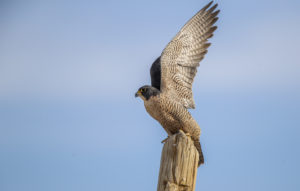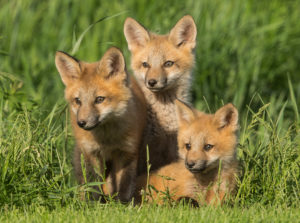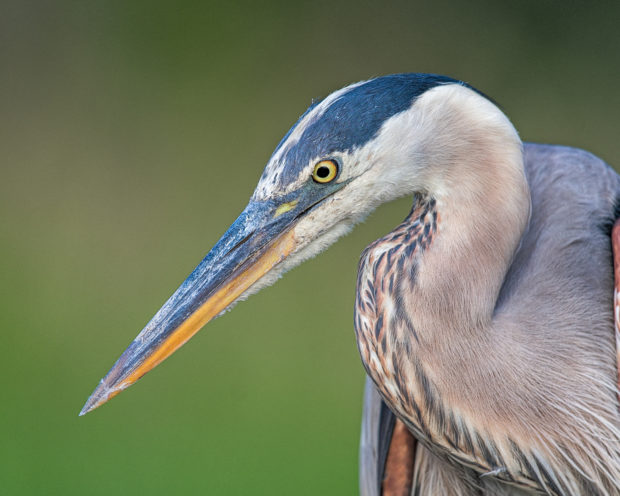We have much more to do and your continued support is needed now more than ever.
National Wildlife Week: Top 10 Cities for Wildlife
Join National Wildlife Federation in celebrating cities making a difference for wildlife
Wildlife in urban areas face unique challenges as we humans pave roads, build storm water systems and expand our neighborhoods.
NWF’s Top 10 Cities for Wildlife are taking concrete steps to address these challenges. These cities are setting aside parks and open space, planting urban forests, and incorporating wildlife conservation into their comprehensive or sustainability plans. When cities support wildlife in their planning processes we see huge gains for urban wildlife.
At the same time, the residents of these cities are gardening for wildlife by installing native plant gardens and supporting schools to create Schoolyard Habitats that help reconnect kids with the wonders of nature.
Happy #NationalWildlifeWeek! Our #UrbanWildlife program ranked America’s 100 largest cities based on their commitment to wildlife-friendly policies, and we’re so excited to honor the nation’s Top 10 Cities for Wildlife: https://t.co/E8PIXGe3WS pic.twitter.com/ECt5muXjCy
— National Wildlife Federation (@NWF) March 12, 2019
Let’s take a closer look at the Top 10 Cities for Wildlife for 2019:
#1: Austin, TX: Austin is number one on many top ten lists, but what could be more exciting than being the number one city for wildlife in the United States? Austin has more Certified Wildlife Habitats than any city in the United States. 2,616, to be exact. The city is a signatory of the Mayors’ Monarch Pledge and a national leader in its efforts to restore habitat and improve city landscapes for the declining monarch butterfly. The city of Austin also promotes the creation and conservation of wildlife habitats through Wildlife Austin. Learn more.
#2: Atlanta, GA: The city of Atlanta’s Climate Action Plan includes a focus on expanding urban parks and greenspaces within the city as well as expanding tree canopy. This seems wise considering Atlanta is known as “The City in a Forest” for its large number of trees and its commitment to restoring urban tree canopy to support wildlife and communities. Learn more.

#3: Portland, OR: Portland has some pretty impressive sustainability plans, such as the Climate Action Plan and the 2035 Comprehensive Plan, which aims to increase backyard gardens, biodiversity, and green infrastructure within the city. The Portland Area Watershed Monitoring and Assessment Program (PAWMAP) measures changes in habitat, water quality and biological communities, to help keep the City on track with its ambitious goals. Learn more.
#4: Indianapolis, IN: The City of Indianapolis has moved from the number eight spot in 2015 to number four this year and currently has 1,101 Certified Wildlife Habitats. The city’s Comprehensive Master Plan has the goal of expanding parkland through the city and creating trails for the community and healthy habitats for urban wildlife. Learn more.
#5: Chula Vista, CA: The City of Chula Vista is new to our list this year. Sustainability plans such as the City Operations Sustainability Plan, the Chula Vista Vision 2020 Environmental Element, and the City of Chula Vista MSCP Subarea Plan promote both physical and environmental health, addressing issues that affect open space, biological resources, mineral resources, and air and water quality. Chula Vista’s NatureScape program promotes the creation of wildlife-friendly gardens. Learn more.

#6: Cincinnati, OH: The City of Cincinnati is a newcomer to list, with its Green Cincinnati Plan that includes a goal to increase by 20 percent participation in outdoors recreation and nature awareness. Cincinnati is also home to the Cincinnati Nature Center as well as the Cincinnati Zoo & Botanical Garden, which both play a key role in biodiversity conservation by educating the community on ways to preserve wildlife. Learn more.
#7: Seattle, WA: The City of Seattle has 974 Certified Wildlife Habitats. Sustainability plans such as the Seattle Climate Action Plan and the Seattle 2035 Comprehensive Plan promise to invest in restoring green spaces, creeks and special urban environmental areas. Learn more.
#8: Charlotte, NC: The City of Charlotte has 1,141 Certified Wildlife Habitats, including 45 Schoolyard Habitats, and is a signatory of the Mayor’s Monarch Pledge. The North Carolina Wildlife Federation provides programs such as The Butterfly Highway, an initiative that aims to restore native pollinator habitats to areas impacted by urbanization. Learn more.
#9: Raleigh, NC: The City of Raleigh has a total of 558 Certified Wildlife Habitats, including 19 Schoolyard Habitats. Like its neighbor city, Charlotte, Raleigh is also involved in North Carolina Wildlife Federation’s Butterfly Highway. Learn more.
#10: Washington, DC: Washington’s sustainability plans such as the Sustainable DC, the 2015 District of Columbia Wildlife Action Plan, and Climate Ready DC work in the area with the goal to protect and restore wetlands, waterways, and aquatic ecosystems as well as providing parkland and/or natural spaces. Learn more.
Our Honorable Mention criteria are not as broad and far-reaching as those used for the top ten list. Honorable Mention focuses on engagement in National Wildlife Federation community and education programs, including Eco-Schools, Schoolyard Habitats, and the number of individually certified NWF Garden for Wildlife habitats. For example, the Houston area is mentioned for Houston Independent School District’s Eco Schools USA and Schoolyard Habitats® initiatives, which include over 100 NWF Schoolyard Habitats and Eco Schools. And nearly 2,000 Houstonians have certified habitats through Garden for Wildlife®.
Please join the National Wildlife Federation in celebrating urban wildlife and creating a nation of wildlife-friendly cities where native plants, wildlife and people live in harmony and thrive.
You can take action in your backyard, balcony or community by creating a Certified Wildlife Habitat™ or ask your city to get involved by joining NWF’s Community Wildlife Habitat™ program.
























